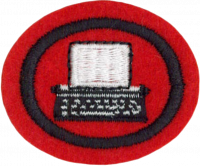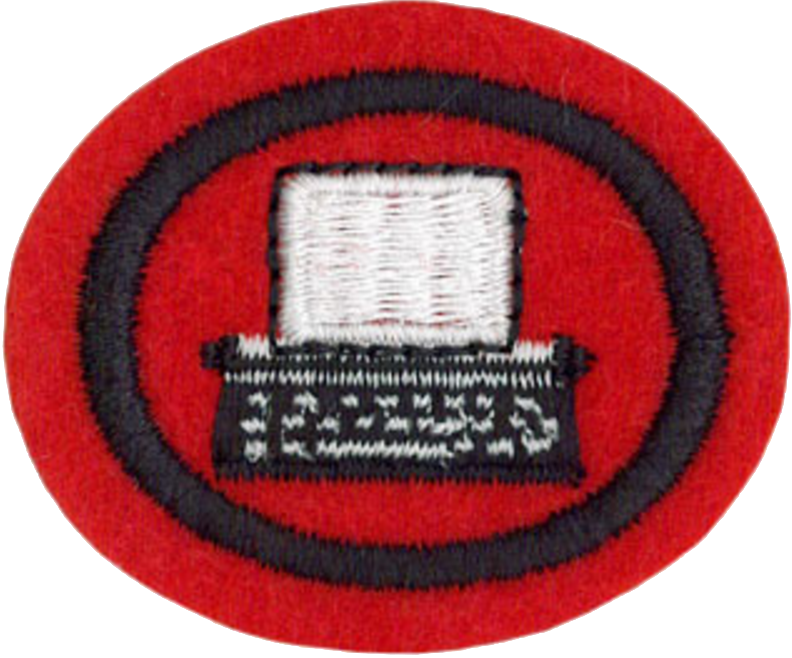Especialidades JA/Mecanografía/Respuestas
From Pathfinder Wiki
< AY Honors | TypewritingAY Honors/Typewriting/Answer Key/es /
1
Mostrar la forma de limpiar, teclear apropiadamente y cambiar la cinta en una máquina de escribir.
2
Conocer la diferencia entre cinta de tela y una de carbón.
3
Identificar las siguientes partes de una máquina de escribir y saber su función:
3a
Marco/Armazón
3b
Teclado
3c
Barra espaciadora/espaciador
3d
Tecla de retroceso
3e
Tecla de cambio de mayúsculas y fijador de mayúsculas
3f
Rodillo
3g
Control de impresión
3h
Paradas del margen
3i
Liberador del papel
3j
Palanca de espacio entre líneas
3k
Control de buscador de líneas
3l
Escala de centrado de papel
- (I believe that is only on the typewriters where the carriage did not actually move - i.e. the electric typewriters, where the typing head/element moved, instead of the carriage).
3m
Sujetador de tarjetas
- Paper is more flexible than card stock. The cardholder is the clear plastic on both sides of the strike area that holds cardstock back against the platen so that it does not lean forward too much because it is bent/rolled around in the platen.
3n
Palanca para sostener el papel
- The paper bail is a horizontal bar across the platen with a number of small rollers to hold down the paper. The PAPER BAIL LEVER was on one side of the carriage which lifted this paper bail.
3o
Palanca para rotar el rodillo
- A modern advance in technology introduced selectable "pitch" so that the typewriter could be switched among pica ("10 pitch", or 10 characters per inch) and elite ("12 pitch"), in one document.
- (This is also in 'newer' typewriters that were usually electric).
3p
Margen de liberación
- The MARGIN RELEASE allowed typing beyond the right MARGIN STOP so that if you had one or two letters to finish the word, you could do that.
4
Saber cómo configurar las pestañas para la tabulación de sangrías. Teclear y tabular debidamente una página con al menos cuatro columnas.
- See Wikipedia about tab stops.
- A tab stop on a typewriter is a location where the carriage movement is halted by mechanical gears. Tab stops are set manually, and pressing the tab key causes the carriage to go to the next tab stop.
- To set a tab stop, you would advance the carriage to each position where you want the TAB key to stop, and press the tab set key. When you are typing, you would use the TAB key to advance the carriage to the TAB STOP, type the information, and press the TAB key to advance to the next tab stop.
- For example, you may want to create table data:
Trains Farm Station Suburban Station City Center
------ ------------ ---------------- ----------- Route101 06:30 am 07:00 am 07:30 am Route102 09:30 am 10:00 am 10:30 am Route202 12:30 pm 01:00 pm 01:30 pm
- So, you would set the tab stops at the first position for each column, and press the TAB key as you finish the information in each column to quickly advance to the start of the next column.
Tab stop Tab stop Tab stop Tab stop
| | | | v v v v
Trains Farm Station Suburban Station City Center ------ ------------ ---------------- ----------- Route101 06:30 am 07:00 am 07:30 am Route102 09:30 am 10:00 am 10:30 am Route202 12:30 pm 01:00 pm 01:30 pm
^ ^ ^ | | | Press TAB key when you finish the text to advance
5
Mostrar cómo centrar información horizontal y verticalmente sobre el papel.
- Center information horizontally
- Count the number of spaces that the paper can contain from left to right (example: 80).
- Count the number of letters for the line you are centering (example: 60).
- Subtract the 60 from the 80, which results in 20 (for this example).
- Divide the result (20) by two, which results in ten (10) (for this example).
- You would start your typing TEN spaces from the left side of the paper.
- Center information vertically
- Count the number of lines that the paper can contain from top to bottom (example: 66)
- Count the number of lines you want to type on the paper (example: 50)
- Subtract the 50 from the 66 which results in 16 (for this example)
- Divide the result (16) by two, which results in eight (8) (for this example).
- You would advance the paper EIGHT lines down from the top before you start typing.
- You have to do BOTH of the above to center information HORIZONTALLY and VERTICALLY.
- Through trial and error, you will learn that there are half steps and other neat stuff you can do to get the information as centered as possible.
6
Mostrar cómo construir un estilo de letras tipo bloque y con sangrías.
- In the block form, everything starts on the left margin.
Al Dubewe
123 Main Street Anytown, State 12345
May 22, 1901
Bigman Oncampus Chief Bottlewasher Antique Typewriter Company 1616 Pennsylvania Avenue Mytown, Yourstate 99999
Dear Bigman Oncampus,
This is a letter in block form. No lines are indented. Your name and contact information is above and on the left, as is the date.
A new paragraph simply skips a line.
And then we have the closing paragraph here.
Sincerely,
Your Signature
Your name Your title
- In the indented form, you would indent each paragraph.
Al Dubewe
123 Main Street
Anytown, State 12345
May 22, 1901
Bigman Oncampus
Chief Bottlewasher
Antique Typewriter Company
1616 Pennsylvania Avenue
Mytown, Yourstate 99999
Dear Bigman Oncampus,
In the indented form, each paragraph is indented. Again, your name and
contact information is at the top, and either centered, or indented on the
right side.
Each new paragraph is indented.
Sincerely,
Your Signature
Your name
Your title
7
Operar una máquina de escribir a una velocidad de 40 palabras por minuto sobre material nuevo por un período de cinco minutos con no más de cinco errores.
- Practice makes perfect. This is your opportunity to show off what you have learned. Enjoy!
Historical Notes
Typewriting was one of the first AY honors, being introduced in 1929. It was discontinued in 1956 and then reintroduced as an antique honor in (anyone know when???).


